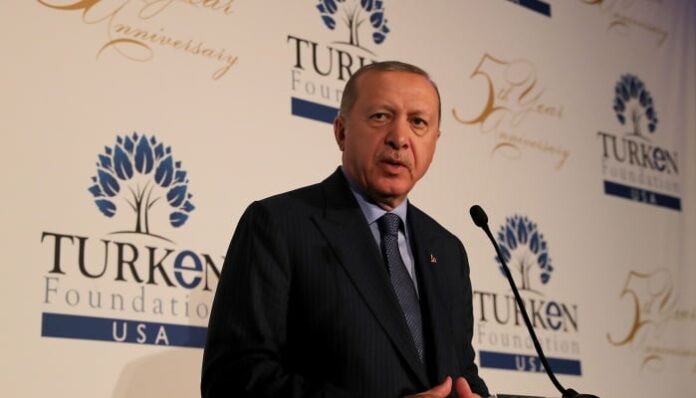Adem Yavuz Arslan*
A foundation tied to the family of Turkish President Recep Tayyip Erdoğan is attracting increased attention in Washington, D.C., after revelations about its extraordinary spending. Newly published Foreign Agents Registration Act (FARA) filings show that the TURKEN Foundation spent more than $48 million on influence-related activities in 2025 alone. For an organization that presents itself as a charity supporting students, the figure is extraordinary and raises immediate questions about what the foundation is actually doing in the United States.
A charity in name, a political tool in practice
The TURKEN Foundation is a New York-based nonprofit founded in 2014 by the Turkey Youth and Education Service Foundation (TÜRGEV) and the Ensar Foundation, two Islamist education charities that support students and dormitory projects in Turkey and abroad.
TURKEN presents itself as an educational nonprofit, yet its activities suggest a much broader mission. The foundation engages in political outreach, messaging and public relations tied to Ankara’s interests. With TÜRGEV and Ensar serving as its financial backbone and both organizations tied closely to the Erdoğan family, TURKEN increasingly looks like an instrument of political influence rather than a student support group. The funding itself originates from TÜRGEV and Ensar — two organizations widely considered extensions of the Erdoğan family network. Their combined funds transfers to TURKEN between 2023 and 2025 reached approximately $77.5 million, according to US watchdog OpenSecrets.
TURKEN and its affiliated foundations have faced recurring questions in both countries concerning political donations by individuals tied to the organization, large-scale real estate acquisitions in Manhattan and opaque funds transfers from Turkey at a time of major economic hardship.
Luxury events during Erdoğan’s visits
TURKEN also hosts high-profile events during Erdoğan’s trips to the United States. These include luxury dinners, gala nights and private receptions in New York and Washington. The gatherings take place in expensive venues and bring together business figures, academics and community leaders. The costs remain undisclosed, but the scale of these events reinforces the perception that TURKEN plays a key role in Erdoğan’s international image campaigns.
A budget comparable to Gulf monarchies
The size of TURKEN’s spending is striking, rivaling the lobbying budgets of wealthy Gulf states such as Qatar, the UAE and Saudi Arabia. Those countries spend tens of millions to influence US policy. According to recent FARA and OpenSecrets data: Qatar, one of the most aggressive foreign lobbyists in Washington, spent between $30 and $40 million annually during its peak diplomatic campaigns. The UAE, a major geopolitical actor in Washington, has at times exceeded $20 million a year. Saudi Arabia, following the crisis over the murder of Saudi journalist Jamal Khashoggi at the Saudi Consulate in İstanbul in 2018, spent around $36 million in a single year. TURKEN’s $48.2 million in 2025 puts it ahead of all three and on par with the lobbying machine of a wealthy petrostate, not with an educational nonprofit representing a middle-income country facing deep economic problems. The comparison raises an unavoidable question: Is TURKEN functioning as a de facto foreign influence arm of Erdoğan’s political network?
What can $48 million buy in Washington?
To contextualize the magnitude: For $48 million, a foreign government can hire multiple top-tier K Street lobbying firms for an entire year. It can fund a fully staffed think-tank initiative complete with research fellows, conferences, policy papers and media campaigns. It can finance extensive soft-power operations, from university endowments to political dinners, cultural diplomacy events and media outreach programs. It can also support network-building within diaspora communities, including political organizing, leadership councils, outreach campaigns and multi-city influence efforts. Simply put, this is not scholarship money. This is a budget one would expect from a state seeking influence, not a student dorm charity.
A broader strategy beyond philanthropy
TÜRGEV and Ensar have long been controversial in Turkey. They are associated with political patronage networks and opaque fundraising structures. Their expansion into the United States through TURKEN suggests a broader strategy. It appears aimed at building an international network capable of protecting the Erdoğan family’s political and financial interests outside Turkey.
Despite the massive spending, none of the foundations has explained where the money went or why costs surged so dramatically. Their silence fuels speculation and raises questions about whether the funds support political messaging, diaspora mobilization, image management for Erdoğan or future contingency planning.
The attention-raising financial activity
With US regulators tightening oversight of foreign influence operations, TURKEN is unlikely to remain outside the spotlight. The foundation has moved far beyond simple student support. It now operates as a multimillion dollar influence mechanism. Erdoğan’s US network is no longer hidden. It is visible, controversial and increasingly suspicious.
Turkish President Recep Tayyip Erdoğan delivers a speech on the traditional gala dinner of TURKEN foundation at Mandarin Hotel as he arrives at New York to participate in the 73rd session of UN General Assembly on September 24, 2018 in New York, United States. AFP PHOTOS
*Adem Yavuz Arslan is a journalist with over two decades of experience in political reporting, investigative journalism and international conflict coverage. His work has focused on Turkey’s political landscape, including detailed reporting on the 2016 coup attempt and its aftermath, as well as broader issues related to media freedom and human rights. He has reported from conflict zones such as Bosnia, Kosovo and Iraq, and has conducted in-depth research on high-profile cases, including the assassination of Turkish-Armenian journalist Hrant Dink. Arslan is the author of four books and has received journalism awards for his investigative work. Currently living in exile in Washington, D.C., he continues his journalism through digital media platforms, including his YouTube channel, Turkish Minute, TR724 and X.
Disclaimer: The views expressed in this opinion piece are those of the author and do not necessarily reflect the editorial stance of Turkish Minute.
[ANALYSIS] Is Erdoğan building a political influence empire in the United States?




